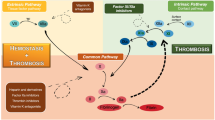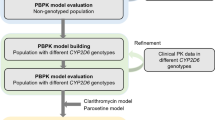Abstract
Background
The response to warfarin, as an oral anticoagulant agent, varies widely among patients from different ethnic groups. In this study, we tried to ascertain and determine the relationship between non-genetic factors and genetic polymorphisms with warfarin therapy; we then proposed a new warfarin dosing prediction algorithm for the estimation of drug sensitivity and resistance in the Iranian population.
Methods
Overall, 200 warfarin-treated patients with stable doses were recruited, the demographic and clinical characteristics were documented, and genotyping was done using a sequencing assay.
Results
The outcomes of our investigation showed that the genetic polymorphisms of VKORC1(-1639 G > A), CYP2C9*3, CYP2C9*2, amiodarone use, and increasing age were found to be related to a significantly lower mean daily warfarin dose. In contrast, the CYP4F2*3 variant and increased body surface area were linked with an increased dose of warfarin in the Iranians. Our descriptive model could describe 56.5% of the variability in response to warfarin. This population-specific dosing model performed slightly better than other previously published warfarin algorithms for our patient’s series. Furthermore, our findings provided the suggestion that incorporating the CYP4F2*3 variant into the dosing algorithm could result in a more precise calculation of warfarin dose requirements in the Iranian population.
Conclusions
We proposed and validated a population-specific dosing algorithm based on genetic and non-genetic determinants for Iranian patients and evaluated its performance. Accordingly, by using this newly developed algorithm, prescribers could make more informed decisions regarding the treatment of Iranian patients with warfarin.
Similar content being viewed by others
Availability of data and materials
The datasets generated during and/or analyzed during the current study are available from the corresponding author upon reasonable request.
Abbreviations
- BSA:
-
Body surface area
- CYP2C9 :
-
Cytochrome P450 2C9
- CYP4F2 :
-
Cytochrome P450 4F2
- INR:
-
International normalized ratio
- MAE:
-
Mean absolute error
- MAPE:
-
Mean absolute percentage error
- MRE:
-
Mean relative error
- SD:
-
Standard deviation
- VIF:
-
Variance inflation factor
- VKORC1:
-
Vitamin K epoxide reductase complex 1
References
Ansell J, Hirsh J, Poller L, Bussey H, Jacobson A, Hylek E. The pharmacology and management of the Vitamin K antagonists: the Seventh ACCP conference on antithrombotic and thrombolytic therapy. Chest. 2004;126:204S-233S.
Kocael A, Eronat AP, Tüzüner MB, Ekmekçi A, Orhan AL, İkizceli İ, et al. Interpretation of the effect of CYP2C9, VKORC1 and CYP4F2 variants on warfarin dosing adjustment in Turkey. Mol Biol Rep. 2019;46:1825–33.
Kim K-A, Song W-G, Lee H-M, Joo H-J, Park J-Y. Multiplex pyrosequencing method to determine CYP2C9* 3, VKORC1* 2, and CYP4F2* 3 polymorphisms simultaneously: its application to a Korean population and comparisons with other ethnic groups. Mol Biol Rep. 2014;41:7305–12.
Lee MTM, Klein TE. Pharmacogenetics of warfarin: challenges and opportunities. J Hum Genet. 2013;58:334–8.
Limdi NA, Wadelius M, Cavallari L, Eriksson N, Crawford DC, Lee M-TM, et al. Warfarin pharmacogenetics: a single VKORC1 polymorphism is predictive of dose across 3 racial groups. Blood J Am Soc Hematol. 2010;115:3827–34.
Carlquist JF, Horne BD, Mower C, Park J, Huntinghouse J, McKinney JT, et al. An evaluation of nine genetic variants related to metabolism and mechanism of action of warfarin as applied to stable dose prediction. J Thromb Thrombolysis. 2010;30:358–64.
Borgiani P, Ciccacci C, Forte V, Sirianni E, Novelli L, Bramanti P, et al. CYP4F2 genetic variant (rs2108622) significantly contributes to warfarin dosing variability in the Italian population. Pharmacogenomics. 2009;10:261–6.
Azarara M, Afrasibirad A, Farzamikia N, Alijani A, Sakhinia E. The effect of GGCX and CYP4F2 gene polymorphisms in genotype-guided dosing of warfarin in patients with a history of cardiac surgery. J Pharm Investig. 2017;47:349–55.
Khosropanah S, Faraji SN, Habibi H, Yavarian M, Mansoori R, Haghpanah S. Correlation between rs2108622 locus of CYP4F2 gene single nucleotide polymorphism and warfarin dosage in Iranian cardiovascular patients. Iran J Pharm Res IJPR. 2017;16:1238.
Bader L, Mahfouz A, Kasem M, Mohammed S, Alsaadi S, Abdelsamad O, et al. The effect of genetic and nongenetic factors on warfarin dose variability in Qatari population. Pharmacogenom J. 2020;20:277–84.
Wattanachai N, Kaewmoongkun S, Pussadhamma B, Makarawate P, Wongvipaporn C, Kiatchoosakun S, et al. The impact of non-genetic and genetic factors on a stable warfarin dose in Thai patients. Eur J Clin Pharmacol. 2017;73:973–80.
Krishna Kumar D, Shewade DG, Loriot M-A, Beaune P, Balachander J, Sai Chandran BV, et al. Effect of CYP2C9, VKORC1, CYP4F2 and GGCX genetic variants on warfarin maintenance dose and explicating a new pharmacogenetic algorithm in South Indian population. Eur J Clin Pharmacol. 2014;70:47–56.
Liang R, Li L, Li C, Gao Y, Liu W, Hu D, et al. Impact of CYP2C9* 3, VKORC1-1639, CYP4F2rs2108622 genetic polymorphism and clinical factors on warfarin maintenance dose in Han-Chinese patients. J Thromb Thrombolysis. 2012;34:120–5.
Wadelius M, Chen LY, Eriksson N, Bumpstead S, Ghori J, Wadelius C, et al. Association of warfarin dose with genes involved in its action and metabolism. Hum Genet. 2007;121:23–34.
Sridharan K, Al Banna R, Malalla Z, Husain A, Sater M, Jassim G, et al. Influence of CYP2C9, VKORC1, and CYP4F2 polymorphisms on the pharmacodynamic parameters of warfarin: a cross-sectional study. Pharmacol Rep. 2021;73:1405–17.
Naushad SM, Kutala VK, Hussain T, Alrokayan SA. Pharmacogenetic determinants of warfarin in the Indian population. Pharmacol Rep. 2021;73:1396–404.
Li J, Chen T, Jie F, Xiang H, Huang L, Jiang H, et al. Impact of VKORC1, CYP2C9, CYP1A2, UGT1A1, and GGCX polymorphisms on warfarin maintenance dose: Exploring a new algorithm in South Chinese patients accept mechanical heart valve replacement. Medicine (Baltimore). 2022;101(29):e29626. https://doi.org/10.1097/MD.0000000000029626.
Gage BF, Eby C, Johnson JA, Deych E, Rieder MJ, Ridker PM, et al. Use of pharmacogenetic and clinical factors to predict the therapeutic dose of warfarin. Clin Pharmacol Ther. 2008;84:326–31.
Zambon C-F, Pengo V, Padrini R, Basso D, Schiavon S, Fogar P, et al. VKORC1, CYP2C9 and CYP4F2 genetic-based algorithm for warfarin dosing: an Italian retrospective study. Pharmacogenomics. 2011;12:15–25.
Karaca S, Bozkurt NC, Cesuroglu T, Karaca M, Bozkurt M, Eskioglu E, et al. International warfarin genotype-guided dosing algorithms in the Turkish population and their preventive effects on major and life-threatening hemorrhagic events. Pharmacogenomics. 2015;16:1109–18.
Namazi S, Azarpira N, Hendijani F, Khorshid MB, Vessal G, Mehdipour AR. The impact of genetic polymorphisms and patient characteristics on warfarin dose requirements: a cross-sectional study in Iran. Clin Ther. 2010;32:1050–60.
Khaleqsefat E, Khalaj-Kondori M, Bonyadi MJ, Soraya H, Askari B. The Contribution of VKORC1 and CYP2C9 genetic polymorphisms and patients’ demographic characteristics with warfarin maintenance doses: a suggested warfarin dosing algorithm. Iran J Pharm Res IJPR. 2020;19:77.
Razavi FE, Zarban A, Hajipoor F, Naseri M. The allele frequency of CYP2C9 and VKORC1 in the Southern Khorasan population. Res Pharm Sci. 2017;12:211.
Marjani A, Gharanjik AM. Genetic polymorphism of CYP2C9 among Sistani ethnic group in Gorgan. Indian J Clin Biochem. 2018;33:208–13.
Azarpira N, Namazi S, Hendijani F, Banan M, Darai M. Investigation of allele and genotype frequencies of CYP2C9, CYP2C19 and VKORC1 in Iran. Pharmacol Rep. 2010;62:740–6.
SoltaniBanavandi MJ, Satarzadeh N. Association between VKORC1 gene polymorphism and warfarin dose requirement and frequency of VKORC1 gene polymorphism in patients from Kerman province. Pharmacogen J. 2020;20:574–8.
Shahin MHA, Khalifa SI, Gong Y, Hammad LN, Sallam MTH, El Shafey M, et al. Genetic and nongenetic factors associated with warfarin dose requirements in Egyptian patients. Pharmacogenet Genomics. 2011;21:130.
Alrashid MH, Al-Serri A, Alshemmari SH, Koshi P, Al-Bustan SA. Association of genetic polymorphisms in the VKORC1 and CYP2C9 genes with warfarin dosage in a group of Kuwaiti individuals. Mol Diagn Ther. 2016;20:183–90.
Özer M, Demirci Y, Hızel C, Sarıkaya S, Karaltı İ, Kaspar Ç, et al. Association of genetic polymorphisms in the VKORC1 and CYP2C9 genes with warfarin dosage in a group of Kuwaiti individuals. Basic Clin Pharmacol Toxicol. 2013;112:209–14.
Xie H-G, Prasad HC, Kim RB, Stein CM. CYP2C9 allelic variants: ethnic distribution and functional significance. Adv Drug Deliv Rev. 2002;54:1257–70.
Pathare AV, Al Zadjali S, Misquith R, Alkindi SS, Panjwani V, Lapoumeroulie C, et al. Warfarin pharmacogenetics: polymorphisms of the CYP2C9, CYP4F2, and VKORC1 loci in a genetically admixed Omani population. Hum Biol. 2012;84:67–77.
Sivadas A, Sharma P, Scaria V. Landscape of warfarin and clopidogrel pharmacogenetic variants in Qatari population from whole exome datasets. Pharmacogenomics. 2016;17:1891–901.
Pautas E, Moreau C, Gouin-Thibault I, Golmard J, Mahe I, Legendre C, et al. Genetic factors (VKORC1, CYP2C9, EPHX1, and CYP4F2) are predictor variables for warfarin response in very elderly, frail inpatients. Clin Pharmacol Ther. 2010;87:57–64.
Shendre A, Brown TM, Liu N, Hill CE, Beasley TM, Nickerson DA, et al. Race-specific influence of CYP 4F2 on dose and risk of hemorrhage among warfarin users. Pharmacother J Hum Pharmacol Drug Ther. 2016;36:263–72.
Auton A, Brooks LD, Durbin RM, Garrison EP, Kang HM, Korbel JO, et al. A global reference for human genetic variation. Nature. 2015;526:68–74. https://doi.org/10.1038/nature15393.
Sano E, Li W, Yuki H, Liu X, Furihata T, Kobayashi K, et al. Mechanism of the decrease in catalytic activity of human cytochrome P450 2C9 polymorphic variants investigated by computational analysis. J Comput Chem. 2010;31:2746–58.
Singh O, Sandanaraj E, Subramanian K, Lee LH, Chowbay B. Influence of CYP4F2 rs2108622 (V433M) on warfarin dose requirement in Asian patients. Drug Metab Pharmacokinet. 2011;26:130–6.
Mehrjoo Z, Fattahi Z, Beheshtian M, Mohseni M, Poustchi H, Ardalani F, et al. Distinct genetic variation and heterogeneity of the Iranian population. PLoS Genet. 2019;15: e1008385.
Caulfield T, Fullerton SM, Ali-Khan SE, Arbour L, Burchard EG, Cooper RS, et al. Race and ancestry in biomedical research: exploring the challenges. Genome Med. 2009;1:1–8.
Pathare A, Al Khabori M, Alkindi S, Al Zadjali S, Misquith R, Khan H, et al. Warfarin pharmacogenetics: development of a dosing algorithm for Omani patients. J Hum Genet. 2012;57:665–9.
Acknowledgements
We appreciate each patient's continued involvement in this study. We also thank all the nurses and staff of Booali Sina Hospital for their assistance during the study. We would like to thank Dr. Haj Manouchehri, Bahar Laboratory, Qazvin, for contributing to method development. We highly thank Dr. Hamidreza Javadi, Qazvin University of medical science, for his valuable and constructive suggestions regarding the initial design of this study.
Funding
This research study was funded by the Cellular and Molecular Research Center, Institute for Prevention of Non-Communicable Diseases, Qazvin University of Medical Sciences, Qazvin, Iran (28/20/17123).
Author information
Authors and Affiliations
Contributions
MFD conceived the idea, carried out the experiments, gathered and evaluated the data, and wrote the main manuscript. FSR edited, guided, and supervised the manuscript. SSF examined and selected the appropriate patients to be included in the study. AJ analyzed and interpreted the data. SC and DHA conceived and designed the experimental methodologies. Finally, BR developed the concept of the presented idea, guided the experiments, supervised the study, and edited the whole manuscript.
Corresponding author
Ethics declarations
Conflict of interest
The authors state that they have no interest conflict.
Ethical approval
The local Ethical Committee of Qazvin University of Medical Sciences (QUMS), Qazvin, Iran, approved this study (IR.QUMS.REC.1397.367), and from all patients, before entering the study, written informed consent was acquired.
Additional information
Publisher’s Note
Springer Nature remains neutral with regard to jurisdictional claims in published maps and institutional affiliations.
Rights and permissions
Springer Nature or its licensor (e.g. a society or other partner) holds exclusive rights to this article under a publishing agreement with the author(s) or other rightsholder(s); author self-archiving of the accepted manuscript version of this article is solely governed by the terms of such publishing agreement and applicable law.
About this article
Cite this article
Farajzadeh-Dehkordi, M., Samiee-Rad, F., Farzam, S.S. et al. Evaluation of a warfarin dosing algorithm including CYP2C9, VKORC1, and CYP4F2 polymorphisms and non-genetic determinants for the Iranian population. Pharmacol. Rep 75, 695–704 (2023). https://doi.org/10.1007/s43440-023-00476-2
Received:
Revised:
Accepted:
Published:
Issue Date:
DOI: https://doi.org/10.1007/s43440-023-00476-2




